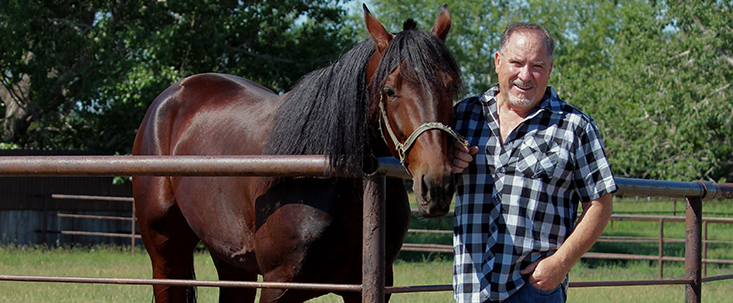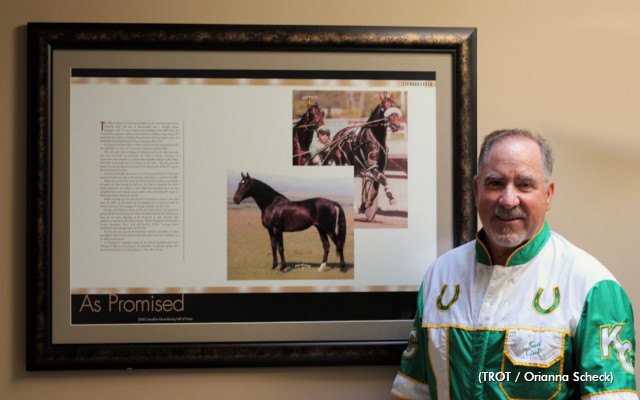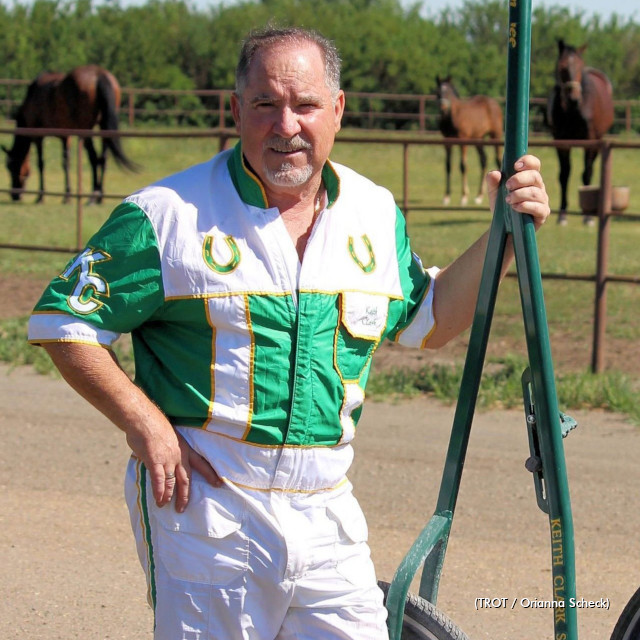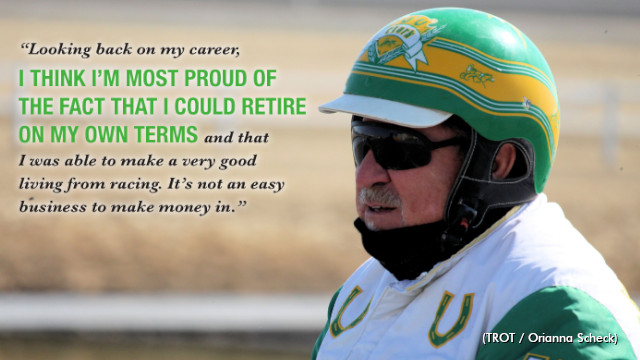A true Alberta legend has retired, and the man who has won multiple O’Brien Awards and Breeders Crowns, and also sits in the Canadian Horse Racing Hall Of Fame, has done so on his own terms.
Recently he spoke to TROT about his early days, his future plans, and many of the great memories from along the way. By Chris Lomon.

One of Keith Clark’s earliest horse racing recollections featured snow, a shovel and a rooftop. He was around 16 or 17 the first winter he accompanied his father, Lorne, from their home in Alberta to Canada’s west coast, specifically, Vancouver, to race a handful of their Standardbreds at Hastings Park, then a dual-breed racetrack.
“This was before Fraser Downs got going and they were racing in the winter on a dirt track at Hastings,” Clark recollected. “It’s always constant rain or snow in the winter in Vancouver. The track really takes a pounding and the odd time it’ll freeze. I remember my dad winning a race in 2:34 there.”
The conditions, weather included, were less than ideal.
“It was tough. I used to sleep in the barn, in the tack room, and they weren’t comfortable in any way. And it snowed a lot. The most money I had in my pocket out there was when management came and asked if any horsemen wanted to shovel the snow off the grandstand roof and the barn roofs because they were worried about having a cave-in. At the time, that money was the most I had seen. I’m just a kid and I’m thinking, ‘I hope my racing life is going to get better than this.’”
Clark didn’t know it at the time, but bigger and better things were to come.
In 50-plus years in the sport, the trainer/driver racked up 6,620 driving wins, 4,302 training triumphs, piloted his pacers and trotters to $35.7 million in purse earnings, and trained his stable to $28.8 million in winnings.
Clark’s list of accomplishments is seemingly endless. His brilliance in the race bike and sterling reputation for developing young horses is revered far and wide across Canada.
A 14-time winner of Alberta’s Horseman of the Year award, he was also the recipient of the 2004 & 2011 O’Brien Award of Horsemanship and in 2009 he was inducted into
the Canadian Horse Racing Hall of Fame.
In 2012, when he eclipsed 100 driving victories on the campaign, it marked the 33rd time in 34 years that he reached the plateau.
“The Hall of Fame, it was a huge moment. I couldn’t believe it. I figured there were 10 people that should have been in there ahead of me. I never really felt that deserving of it, but it was a heck of a moment. I’m very appreciative of it. You don’t really feel you belong in that company. That was the way I felt.”
Clark’s top equine star over the years was As Promised, who retired with a mark of 1:50.2 (taken back in 1993) and earnings of $669,639. Exceptional both on the track and in the breeding shed, As Promised, purchased for the modest sum of $16,000 at the 1990 Kentucky Standardbred Sale by Clark, Blaine Dickson, Robert Cardwell and Charles Campbell, won 71 races – including a victory in 1992 Western Canada Pacing Derby – and then sired the winners of more than $39 million. The son of the legendary Abercrombie once reeled off 18 straight victories, and also boasted other winning streaks 17 and 10 in a row.
In 2006, As Promised was inducted into the Canadian Horse Racing Hall of Fame, a few years before his trainer/driver.

Another standout was Thatll Be Me, who took the 1995 Breeders Crown at Northfield Park in Ohio, and earned $759,202 with 42 wins in 126 starts. Other notable Clark trainees include Just Doodlin, who bankrolled $706,270 and posted 58 wins in 134 starts, Spry Ty ($198,015), Clintons Cigar ($362,736), Artful Hanover ($450,972), Sharkalucci ($70,584), First Class Horse ($556,180) and the list goes on.
He had three mares that won the Northlands Filly Pace: Rons Girl, Sippin Time and Ma Belle Hall. A homebred daughter of As Promised, Rons Girl earned $576,458 and took 29 of 52 starts, including the 2000 Breeders Crown at The Meadowlands. Sippin Time, another homebred, earned $322,434, and Ma Belle Hall won 19 of 41 races, earned $316,969 and was runner-up in the 2001 edition of the Nat Christie - versus the boys.
Of his abundance of accomplishments though, it is one night in particular that stands out for Clark all these years later.
“I can remember one time we were racing in Windsor – I couldn’t get starts for my horses here in Alberta, and we went there one winter. We won the Open at four different places, all on one Saturday. We won in British Columbia, Northville, Woodbine and The Meadowlands. I can still recall that. That kind of makes you look back and realize how lucky I’ve been to have lots of good horses.”
The man who orchestrated all of those successes has mirrored the horses under his watchful eye – talented, resilient and held in high regard.Ever the competitor, nothing, it seemed, could ever keep Clark away from his racehorses or the racetrack.
In late September 2018, that all changed.
After line driving some colts one day, he found himself struggling for breath, and experiencing tightness in his chest. A trip to the emergency ward and a battery of tests revealed a frightening diagnosis.
“I was slowing down around that time and had less horses, but was still racing about 15 to 20. It was a big surprise when I found out I needed quadruple bypass surgery. I thought I was indestructible, but I wasn’t. The mental side of that was the toughest. Physically, it wasn’t too bad at all. It’s a tough operation, but I came out of it really well and the doctor has been happy with the way things have gone. I lost a bunch of weight and I’m in better shape than I’ve been in a long time.”
Two things Clark didn’t lose though were his competitive edge and winning touch.

“It was no fun being on the sidelines. I wanted to get back out there, for sure.”
And so he did, armed with his typical self-deprecating wit and humble view of all his experiences.
His recent retirement from training was done in typical Clark-like fashion, understated and without want of any fanfare. It was fitting also that his final drive on a horse that he trained resulted in a victory, with Blue Who, when the pair captured the 1st race on June 8th at Century Downs.
And although he truly is retiring, something that many in this sport actually never end up doing, the good news for Canadian horse racing is that he’ll still have ties to the game.
“When COVID hit, I really knew that it was time to stop. I didn’t have the same desire to be at the racetrack as I once did. It was just time and I was ready for change. I’m still going to have a handful of broodmares. I certainly won’t be out of the sport. I’m going to raise a few babies and sell them at year a couple of racehorses, buying a few babies in partnership, and leaving them down east with a trainer. I still like getting in the cart in the morning, but those days will be fewer
than before. By no means am I going to be [completely] out of it.”
In fact, one broodmare currently in part-ownership to Clark has a good two-year-old filly, from the first crop of Walner, racing right now - Lilbitalexis (2,1:52.2 -’21; $75,100). “I bought the mare a few years back as a yearling and really liked her training down,” Keith shares. “She didn’t make it to the races for a few reasons but we bred her to Cantab Hall and her first colt made about $200,000. We got $105,000 for the Walner filly, who is racing great so far, and she’s back in foal to Walner again.”
Perfect timing for a chance at some supplemental income to go along with retirement.
So now Keith Clark will deservedly reap the rewards of decades of hard work, having navigated good times and bad, all with a winning attitude. He’ll spend two-thirds of the year in Alberta and four months in the house he had built in Gold Canyon, Arizona, a little less than a two-hour drive northwest of Tucson, and 45 minutes east of Phoenix.
It’s a spot where tranquility and serenity go hand-in-hand, and a place, Clark happily acknowledges, that won’t require him to shovel snow off of any more rooftops.

“That’s definitely a big benefit,” he says with a laugh. “Looking back on my career, I think I’m most proud of the fact that I could retire on my own terms and that I was able to make a very good living from racing. It’s not an easy business to make money in.”
Clark managed to find a winning formula.
“I was working in the barns for as long as I can remember, so it’s been a long go for sure. I knew right away that I was destined to be in this industry. Like most of the people who grow up in it, you fall in love with it...and I sure did just that.”


